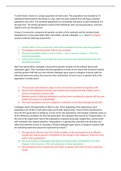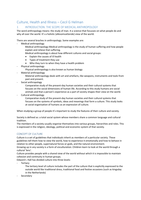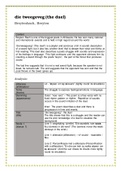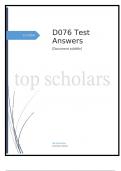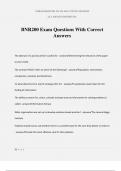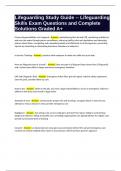Comment closely on the ways in which Duffy presents women in ‘Mrs Midas’. How far does it
reflect the style and concerns of Duffy’s poetry in The World’s Wife?
Duffy’s poem ‘Mrs Midas’ from The World’s Wife exemplifies the poet’s accomplishment of
subverting mythological and traditional tales, undermining famous men of history by relaying stories
from their spouse’s perspectives. ‘Mrs Midas’ presents themes adhering with the purpose of the
collection as a whole; Duffy inverts gender roles by giving women, marginalised in a patriarchal
world, a voice. In ‘Mrs Midas’, Duffy accentuates challenges in matrimony through exploring love,
loss, and hatred stimulated by male ego. Duffy amalgamates colloquialism with lyrical-form, while
incorporating humour, irony and intertextuality, accentuating her renowned tongue-in-cheek
approach to present women as superior and highlight male related issues.
Initially, Duffy presents Mrs Midas as a contemporary housewife with the opening setting being an
image of domesticity. The homodiegetic narration throws us into the speaker’s perspective in the
form of a retrospective dramatic monologue, with a nostalgic tone made evident in the final stanza.
Through employing this frequently featured form, it enables women to have a voice as internal
thoughts and backstory of characters are heard, when they have traditionally been silenced. Initially,
Duffy swiftly changes from a colloquial to a lyrical tone, personifying the kitchen to suggest peace
and serenity. The room, like its occupant, is ‘relaxed’ and has ‘steamy breath’, which connotes
suffocation, further supported by her opening the window. This is significant as the collection
focusses on female oppression, particularly those with renowned husbands, and the inability to
express their emotions. The simile, ‘like a brow’ has connotations of wiping the glass to gain clarity,
whilst representing a gesture of distress, thereby suggesting troubles beneath the surface. The
following simple sentence acts as an anacoluthon, the harsh tone of alliterative plosives in ‘standing
under the pear tree snapping’ suggests disruption; the imagery of growth is juxtaposed with the
tree’s destruction. Subversion of nature is evident as ‘the dark of the ground seems to drink the light
of the sky’; the metaphor sets an apocalyptic tone. Duffy employs humour to mask the speaker’s
bewilderment of the golden pear shining ‘like a lightbulb’. This simile is interrupted with a caesura,
followed by the declarative sentence ‘On’ before moving onto a rhetorical question, wondering
whether they were ‘fairy lights’. Through humour and Mrs Midas’ initial confusion, Duffy presents
women as naïve differing greatly to other omniscient personas in Duffy’s collection, however this
confusion brews tension within the monologue.
Duffy often uses a dominant female voice with the absence of the male narrative to present women
as empowered, for example ‘Queen Herod’ protecting her child at all costs. This poem transgresses
traditional poetry form as there is no rhyme, despite the even stanza lengths. This represents
subversion of traditional norms, supporting the purpose of the collection as a whole. The lack of
rhyme presents the poem like a story whilst allowing the mood to change as the poem proceeds
with an increased pace, reaching a crescendo of fear towards the middle before settling back to a
tone of resignation. A lexical field of gold develops as King Herod’s powers become more evident by
the ‘glass, goblet, golden chalice’. This alliterative asyndetic triadic list is rhythmic and hypnotic to
echo the physical transformation of the glass, reflecting the vessel’s increasing status becoming
more suited to a King. This represents imagery of greed and whilst King Midas’ status is increasing,
Mrs Midas’ remains the same, highlighting the unfair distribution of power. The ‘golden chalice’
echoes a poisoned chalice, foreshadowing his fate either at the hands of his wife or own power. At
the crisis, Mrs Midas is portrayed as rational despite her initial ‘scream’ as she decides to listen to
him. The diction abruptly changes as the sentences become staccato and functional, employing
factual vocabulary, making actions seem urgent, almost frantic, to increase the narration’s pace
while she ‘locked the cat in the cellar’. She asserts her dominance over her husband, making ‘him sit
on the other side of the room and keep his hands to himself’, a subversion of traditional gender

